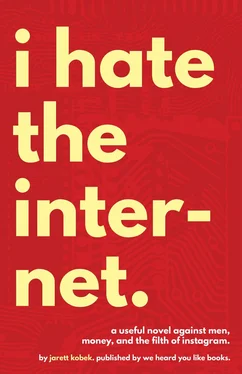She still had the accent.
So there Adeline found herself at CCA, talking to Kevin’s students. The students struck her as interesting and bright. She was talking about the realities of self-publishing.
Adeline loved situations in which she addressed a captive audience. She was surprised by how coherent she could be when speaking to a crowd.
This was unusual because she had grown up in California. She had lived in California for most of her life. Her coherence was unusual because people from California are the most inarticulate people in the world.
People from California punctuate every other word with like and you know . This is not an exaggeration. This is, like, you know, true.
It was while she was still in high school that Adeline adopted her Transatlantic accent. This accent sounds half-way American and half-way British. Other than upper class snobs and actors in early sound films, no human being has ever used this accent. It is entirely artificial. It died out around 1965.
Adeline had adopted a Transatlantic accent in 1984 after watching the film Breakfast at Tiffany’s .
Breakfast at Tiffany’s was about a male sex-worker who bullies a female sex-worker out of sex work so that the female sex-worker can submit to the male sex-worker’s misogynistic love. Much of this bullying happens while a yellowfaced Japanese caricature screams in a stairwell.
The female sex-worker is played by Audrey Hepburn. She’s reinvented herself from Southern White trash named Lula Mae into a resplendent glamour girl named Holly Golightly.
She is stunning. She is everything. She speaks with a Transatlantic accent.
For a woman who loved a captive audience, Adeline had a bad habit when she spoke before crowds.
She displayed an inability to stay on topic. She had recognized this habit and fostered it. She liked the conversational drift. She thought it was charming.
Adeline had forgotten the ceaseless vigilance required of women who live in a society that hates women. She’d forgotten that only men were allowed conversational drift. She’d forgotten that conversational drift in women was not seen as charming.
Here were some of the adjectives that people, both men and women, had thought about Adeline’s conversational drift: ditzy, flighty, silly, goofy, whimsical, crazy, scattered, self-important.
When Adeline was speaking to Kevin Killian’s students, she began with self-publishing. Then she moved to Kathy Acker, a writer whom Kevin Killian had known, and then she moved to Dorothy B. Hughes, a writer who died before Kevin Killian could know her, and then moved to Internet Piracy and then moved to The One Thousand and One Nights and then moved to the Middle East and then moved to Middle Eastern politics and then moved to the Arab Spring and then moved on to Beyoncé and Rihanna.
The Arab Spring was a name given by people in America to events that occurred between the years 2010 and 2012.
The citizens of various Arabian nations had staged a series of protests and revolts against their governments. Americans called this the Arab Spring.
Some of these protests and revolts lead to the toppling of social orders. Other protests and revolts lead to the re-entrenchment of social orders and a brutal civil war in Syria.
American journalists loved the Arab Spring. The narrative of the Arab Spring in the American media was the same narrative that the American media perpetuated whenever any other country went into revolt.
This narrative was very simple. This is what it said: People in a country without a tradition of European thought are staging a revolt with the inevitable end point being an embrace of human rights as devised by Enlightenment and post-Enlightenment thinkers.
In other words, all revolutions happened because everyone everywhere wanted to be Americans.
The human rights which the American media assumed all revolutionaries would embrace were rough analogues for America’s own Constitutional Rights . The general belief was that these rights originated from the Constitution of the United States of America.
This very peculiar document had been written by slave holders and was cherished by a great number of Americans as a sacred text of human liberty, something inspired by The One True God.
The One True God was an idea that took many forms and shapes. More than anything, The One True God was a potent weapon used by sexually repressed members of society to inflict misery on everyone else.
American politicians were fond enough of The One True God that they had adopted IN GOD WE TRUST as the national motto. The national motto appeared on each piece of paper American money.
This was a spectacularly perverse marriage, but one exhibiting a peculiar and cruel logic.
After all, no other imaginary things had inflicted as much suffering on the American people as money and The One True God.
The many forms and shapes of The One True God did not come close to describing the actual God.
The actual God was wonderful and useless.
The actual God was nothing more and nothing less than the sound of Etta James singing “I’d Rather Go Blind.”
The actual God was nothing more and nothing less than the sound of Shirley Collins singing “Lady Margaret and Sweet William.”
The actual God was nothing more and nothing less than the sound of Elvis Presley singing “Long Black Limousine.”
The actual God was nothing more and nothing less than the sound of Abner Jay singing “I’m So Depressed.”
Because the American media was fueled by advertising, its narrative of revolution mimicked the method of advertising, presenting both a stated idea and an intended one.
The stated idea was the embrace of human rights, which is to say a replica of American Constitutional Rights .
The intended meaning was the idea that countries liberated by an embrace of human rights would be a great place to sell the goods of multinational corporations.
To the surprise of no one, these multinational corporations were generally the same corporations that fueled the American media with advertising revenue.
The Arab Spring was the moment during which the American media collapsed both the stated and intended meanings into one thing. The reporting had focused on Facebook and Twitter.
Here are some headlines from the period:
Is Egypt About to Have a Facebook Revolution?
Egypt’s Revolution 2.0: The Facebook Factor
The First Twitter Revolution?
Was What Happened in Tunisia a Twitter Revolution?
Social protests staged in countries thousands of miles away, on a different continent, were covered as advertisements for multinational corporations headquartered around and near San Francisco.
Adeline’s friend J. Karacehennem, whose last name was Turkish for Black Hell, went to Egypt one month after its Facebook revolution lead to the overthrow of Hosni Mubarak, a dumb asshole who had been in power for thirty years.
Lots of Egyptians talked to J. Karacehennem about the protests. Many had been in the protests.
No one mentioned Facebook. No one mentioned Twitter.
Mostly people talked about money and how they had none.
Spring is one of the four seasons that occurs in temperate zones.
Almost all the territories hosting protests during the Arab Spring were located either in the Subtropics or the Tropics.
In the Subtropics and the Tropics there are, at best, two seasons. A wet season and a dry season.
So that was another miracle worked by American corporations headquartered near, in, and around San Francisco: the first ever arrival of Spring in the Middle East.
Here is what Adeline said about Internet Piracy, in response to a question posed by one of Kevin Killian’s students about the impact of the Internet on sales of Trill :
Читать дальше












